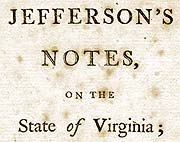A Hunger for Knowledge
|
"Nature intended me for the tranquil pursuits of science, by rendering them my supreme delight." - Thomas Jefferson
|
 |
Thomas Jefferson's Notes in the State of Virginia was an all-encompassing look at the state he called home. It covered everything from politics to climate to geology. Image courtesy of the Library of Congress. |
Thomas Jefferson was a learned man of science who constantly strived to quench his intellectual curiosities. His library contained more than 1,250 volumes, and he was considered an expert in mathematics, astronomy, anatomy, physics, mechanics, meteorology, architecture, and botany. In addition, he could both read and write in Greek, Latin, French, Spanish, and Italian. Jefferson even had an extensive collection of fossils located in the East Room of the White House!
Jefferson expressed some of his knowledge in his Notes on the State of Virginia, in which he recorded his detailed observations of the flora, fauna, rivers, mountains, geology, climate, laws, politics, populations, and fossils of his home state. Always open to new discoveries or theories, he believed that science was beneficial to human society.
In his instructions to Lewis and Clark, the president advised them to observe "climate as characterized by the thermometer…by lightening, hail, snow, ice, by the access & recess of frost, by the winds prevailing at different seasons, the dates at which particular plants put forth or lose their flowers, or leaf, times of appearance of particular birds, reptiles or insects."
His instructions continued: Observe "the animals of the country generally, & especially those not known in the U.S. the remains and accounts of any which may [be] deemed rare or extinct," as well as "the face of the country, its growth & vegetable productions; especially those not of the U.S."
next > |



